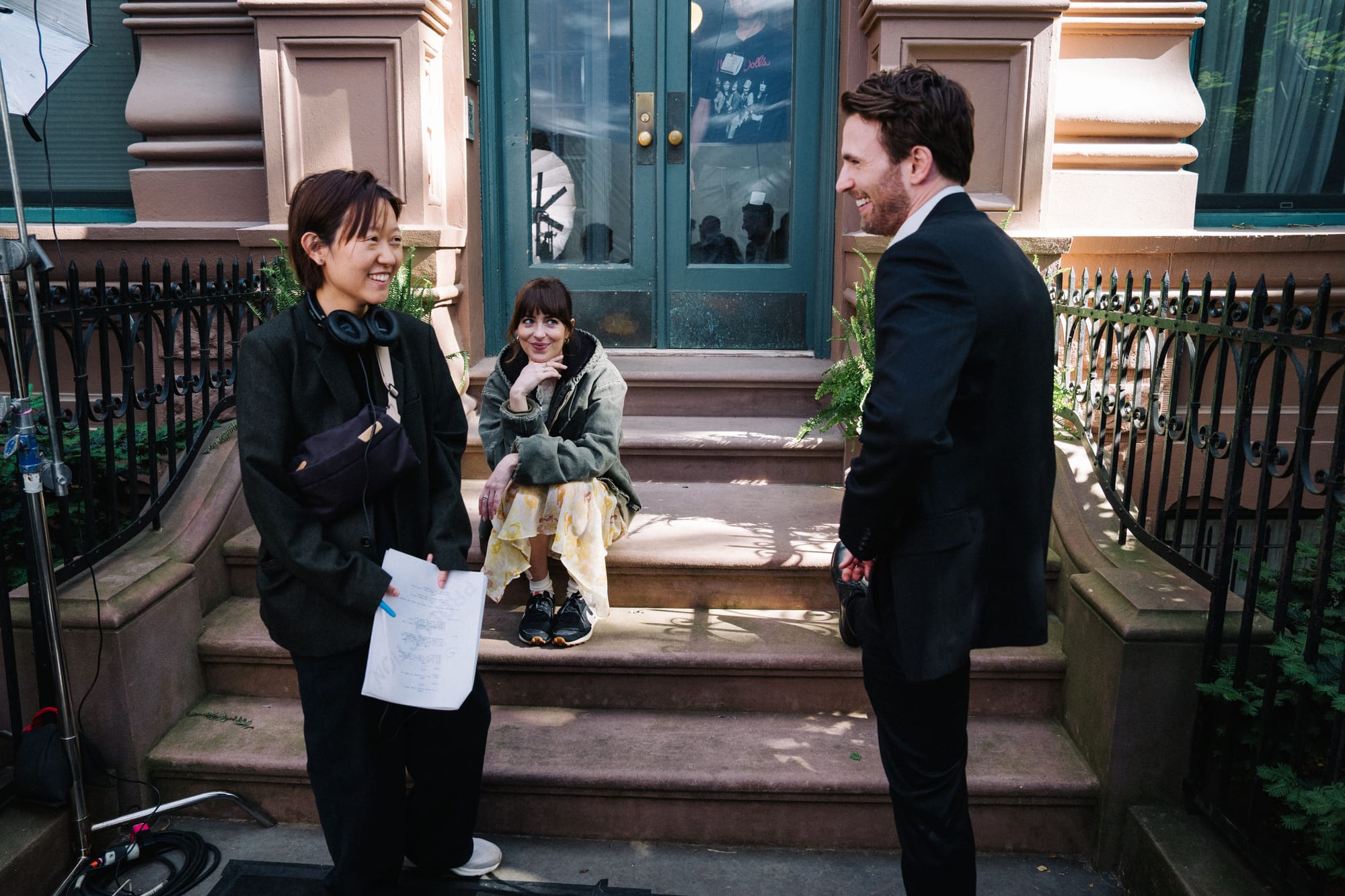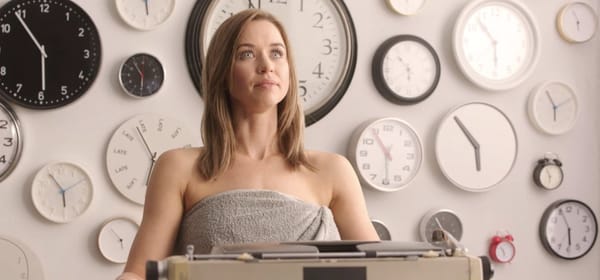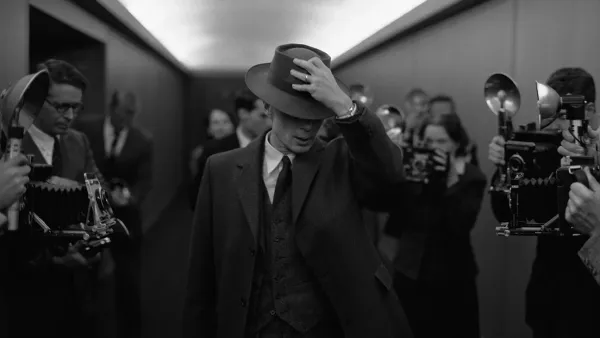🇬🇧Materialists: "You're Perfect." (Spoilers)
A screed against cynicism, Celine Song set herself the mission of rationalising irrationality - and mounting a 360 degree critique of rationality itself.

Want to read our other "Materialists" Reviews? 🇺🇸Michel and 🇨🇦Anika gave us their thoughts on the film too!
TW: Discussion of Sexual Assault
At the centre of this film is the concept of control via Math. Math, as we all know, is not just a rhetorical term used to describe "rational, evidence-based reality" - it is almost the law we abide by globally, across all our paths in life, as being inscrutable, undeniable, absolute fact.
So much so, that as humans, we sometimes stretch that definition out to cover all sorts of things – like for instance, the natural phenomenon of human interaction. Yes, we all know rationally that human interaction can't be quantified, and we know that those who seek to do so are sociopaths.
Yet - underneath it all - we all still do the math.
We do the math thinking it will help us evade harm. We do the math so we can brag. We do the math so we can feel correct in our choices. We do the math to discount ourselves from big rooms that feel scary, or to allay imposter syndrome, or to push ourselves into new places. We do math into the future, math about our pasts, math to make decisions, math to compensate for our decisions. We buy a brownie and do the math on how many gym sessions cancel it out.
We all know that this attempt at rationality is irrational. But when we're lying on the hotel bed in our wedding dress, worried we've made an irrational decision stemming from an irrational bit of reasoning, it only takes one person to re-organise the math before we feel we're a normal, rational woman again.
The hidden fear of irrationality – the hidden urge of it – underpins the entirety of our modern world, in ways that would take a dissertation to unpack. The fear of the irrational, dirty urge – and the love of the rational, clean choice – can be traced back to Puritanism and Christian Conservatism (as can many things).

I became a fan of Celine Song with the rest of the world - during Past Lives. Here was a story about irrational feelings that shook down into very rational ones. Past Lives was all about math - I leave, you far, new love, time passes, oh what could have been, long stare, take the taxi to the airport, cry in the arms of my husband, this is how it's meant to be.
The moment I heard "Materialists" existed, I knew that it simply couldn't end any other way – love would have to win over math this time.
In many ways, Celine takes the rationality of Nora from her debut and drives it to 11, finding the most "ugly" arc for the implications of this level of rationality, and then putting it up against the irrational, intangible nature of human interaction as an actual phenomenon.
This is the risk at the heart of it all that we all take, constantly, and refuse to acknowledge - we are not actually safer for having appeared, to ourselves, to be rational.
Rationality will not save you. Math cannot save you. These are not the rules that govern all things. The mind, the heart, and the interactions between humans cannot be mapped. If they could, then Generative AI would be rational. Computers would be infallible. There would be a pattern you could teach, in 1s and 0s, and this way would be the way, and there would be no such thing as risk.
This is not the world we have, and actually, any attempts at putting rational thought above everything will only make you unaware of the true risk you are taking on.
A key plot point in the film is Sophie's assault, which is the result of Lucy's work as her matchmaker. Lucy's job is to turn this intangible mess of a dating scene into a rational card game - matching. At first unable to see a single detail in her notebook that could have tipped her off that this Mark guy was a monster, she finds it impossible not to let this immediately change her view of the entire enterprise.
Why? Because she thought she was rational enough to spot an abuser.
Trying to meet with Sophie doesn't fix it – she's desperate to fix it, because being the woman that can't fix it is against her personal, rational self-image – but this isn't something she can think her way out of. As she becomes more and more affected by the fact she is directly responsible for a formative trauma in a woman's life that she was unable to forsee, she starts to unravel the very concept of control and math itself. First, through her work, then her personal relationships, and then finally being able to show up for Sophie at the end of the film.
This journey, across its most intense moments and its most feather-light, is a trial by fire crash course of letting go. It reminded me so much of my own journey to understanding that certain parts of life - often the ones that mean the most - aren't for other people to decide and calculate with you, but have to come from that ineffable, instinctual place at the bottom of your soul where your knowing is.
I have hardly talked about the two male leads of the film, because their function is secondary to Lucy's journey with the concept of rational choices. She wants to partner with someone who makes her life comfortable – and there are materialist ways of getting there, of course – and Harry showed her every single facet of what that would look like.
But, at the end of the day, when she panicked, when she felt lost and useless and worthless and scared, when her identity was threatened - she didn't trust that Harry would be able to hold her. She trusted John. That didn't mean she couldn't come to trust Harry - but that moment revealed to her what "someone who makes her life comfortable" actually looks like.
A shitty car, taking commercial auditions, and a couple more shifts picked up isn't the deal Lucy and John shook on at the end - they shook on Love, and by way of trust. When things are bleak, do you trust me to always see the best in you? Yes - because you've already said you can't help but do so. It's irrational, it's uncontrollable in you, it will always be there.
Lucy is very clear under those fairy lights - "I'm materialistic and judgemental" - and she's sure John hates that. Somehow, despite how awful it feels for him, despite how bad it makes him feel - he doesn't hate her. He still loves her. There's no math for that.
Somehow, despite life being decidedly less comfortable for her with John, she still returns, again and again, using him as her resting place before trying again at the woman her Math says she is. She can't help it. John isn't pictured as a bad guy - he's not picky or mean, he's just a lower income actor in a city that has no patience for broke boys. He's doing OK, all things considered, for an actor in their 30's still trying to break in (Kind of feels like Pedro would have played this role better seeing as he lived it, but hey...).
At the centre of this film is the concept of control via Math - and how, sometimes, we're convinced that calculations are the grown up, rational thing to do - and that doing so will prevent us from getting hurt.
Celine says - life will hurt you anyway. No amount of math will save you. Learn to trust your inner knowing. If you truly love, and let yourself be loved - then let that be enough. You won't need to explain it if you have it.
It's the easiest thing in the world.




